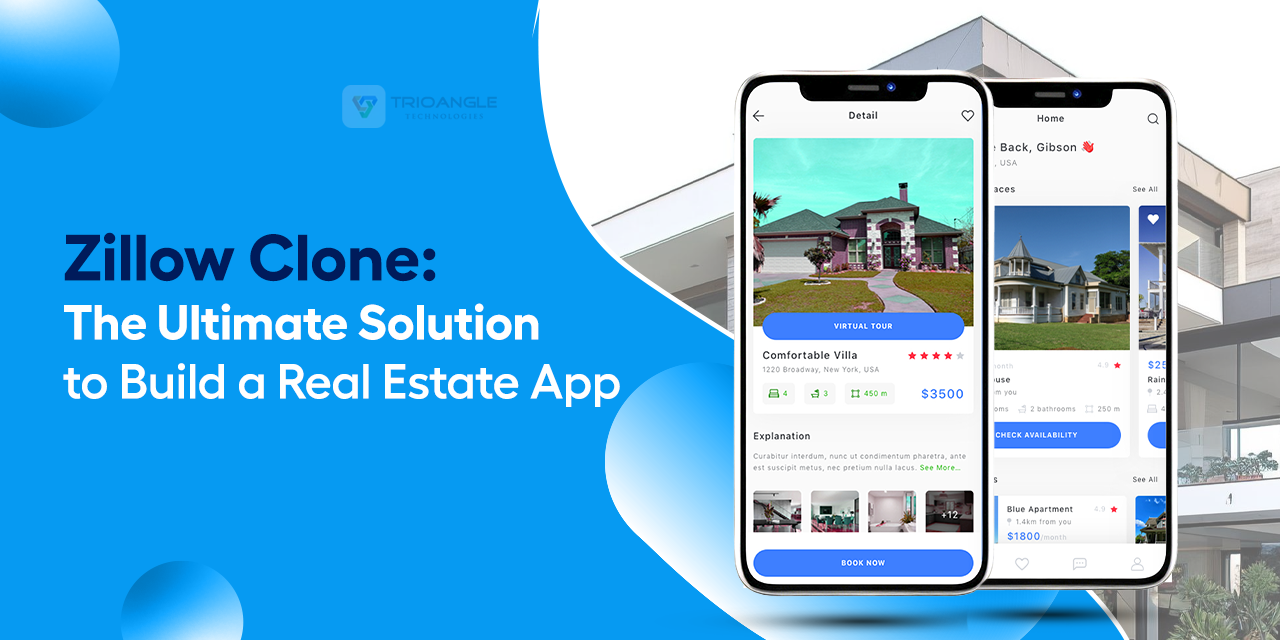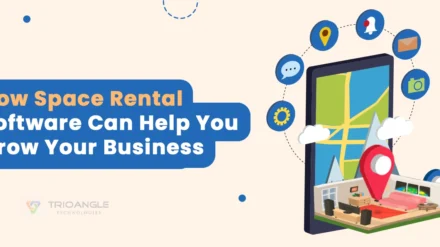Going digital is the trend of this era, and the real estate market is embracing it as well. The online real estate market has become the go-to option for property buyers, sellers, and renters alike.
Zillow, one of the most popular real estate apps, provides users with a convenient way to list and explore properties online.
According to recent statistics, the global real estate software and apps market is projected to reach $4,644.6 million by 2031, with a CAGR of 2.9% during the forecast period from 2024 to 2031.
If you’re looking to capitalize on this growing demand for real estate platforms, a Zillow clone app development is a smart way to start an online rental property business.
Join us as we explore everything you need to know about building a Zillow clone app!
What is a Zillow Clone? And How Does It Work?
A Zillow clone is a customizable, ready-to-launch real estate app solution that replicates the core functionalities of Zillow, a leading platform for buying, selling, and renting properties online, including homes, apartments, and commercial spaces.
Here’s a breakdown of how a Zillow clone website typically works:
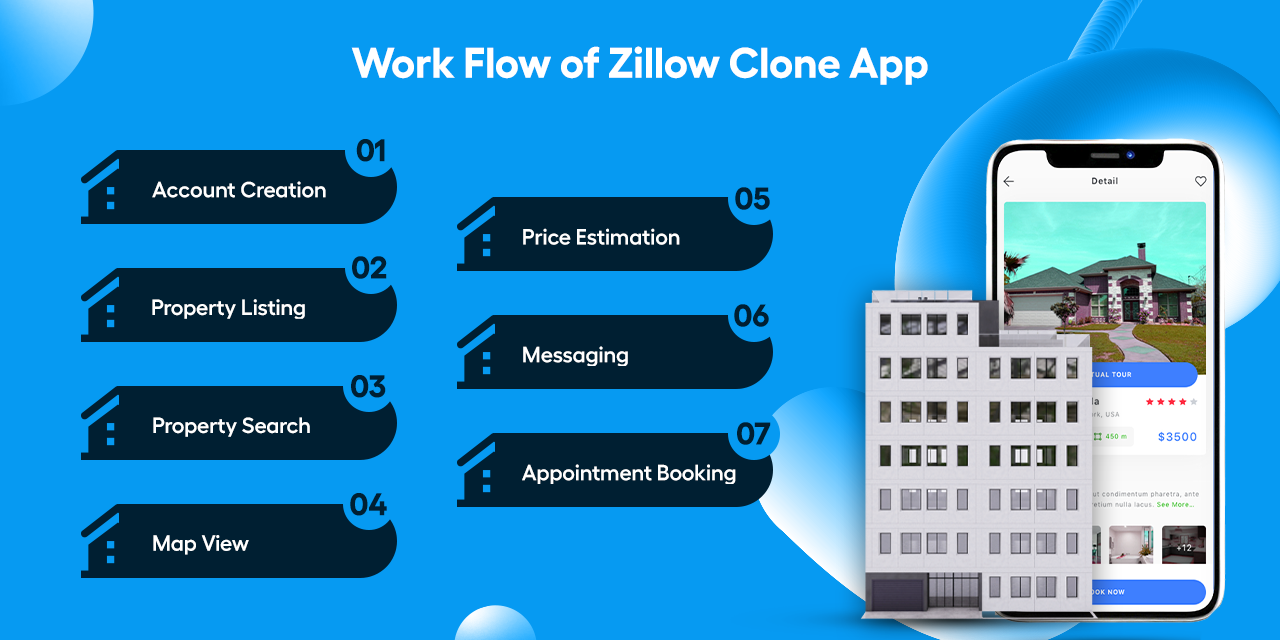
- Buyers, sellers, and real estate agents create accounts on the platform to access its services.
- Sellers or real estate agents list properties with details like location, price, photos, descriptions, and amenities.
- Buyers or renters can browse through an extensive list of properties using various filters, such as price range, location, and size.
- The platform typically includes maps, allowing buyers/renters to visualize property locations and explore nearby amenities.
- Zillow like apps often offer price estimation tools, helping buyers/renters understand market prices based on historical data, trends, and area specifics.
- The buyers/renters can contact sellers directly through the platform’s built-in messaging system to address any questions or concerns.
- The platform may also support booking appointments for property visits or virtual consultations.
By providing a comprehensive online real estate marketplace, a Zillow clone app simplifies the real estate process, making property transactions more accessible for users.
Now that you understand the core aspects of the Zillow clone app, you might have a question, “how to make an app like Zillow?” Keep reading to explore further.
Why Choose a Zillow Clone for Real Estate App Development?
Choosing a Zillow clone for your property rental app development can be an advantageous decision for several reasons, including:
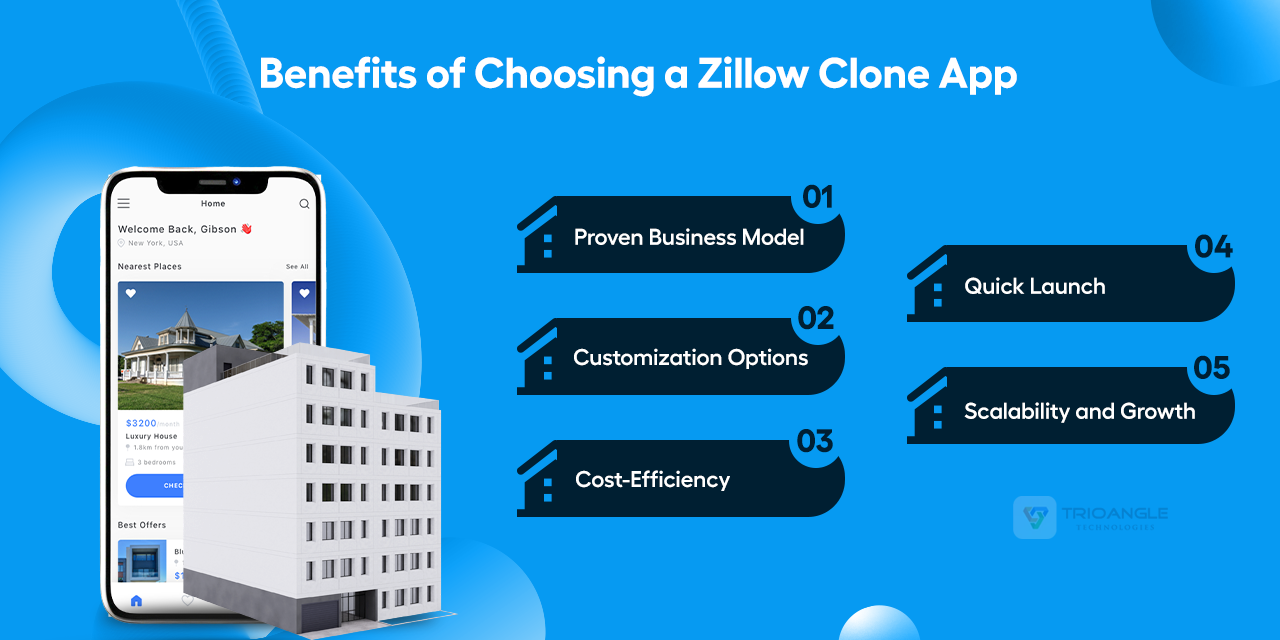
Proven Business Model
Zillow, a leading name in the real estate market, has established a successful business model that connects buyers, sellers, and renters through its user-friendly platform. By choosing a Zillow clone, you are adopting a tried-and-true approach, which significantly reduces the risks associated with launching a new app.
Customization Options
A Zillow clone script offers full customization options, allowing you to tailor the platform to meet your business goals. You can add, remove, or modify features and personalize the app’s design, colors, and branding to reflect your vision.
Cost-Efficiency
Building a real estate app from scratch can be costly due to expenses related to hiring developers and designers, and managing technology infrastructure. Opting for a Zillow clone script is a cost-effective alternative, reducing both development time and costs. You can launch a fully functional app without any financial burden.
Quick Launch
One of the key advantages of using a Zillow script is its fast deployment. Unlike developing a real estate platform from scratch, which can take months, a clone app can be launched in just a few weeks. This rapid turnaround enables you to enter the market quickly and start attracting users.
Scalability and Growth
The Zillow clone script is designed to be highly scalable. As your user base grows, the app can easily handle increased traffic and listings without performance issues. Whether you plan to expand to new markets or add more features, a Zillow clone ensures smooth scalability.
Key Features of a Zillow Clone App
The real estate industry is growing, with Zillow like apps transforming the way people buy, sell, and rent properties, making the process simpler. To stay competitive, these apps must offer all the essential features that enhance the user experience.
Here are some key features for your Zillow clone app development:
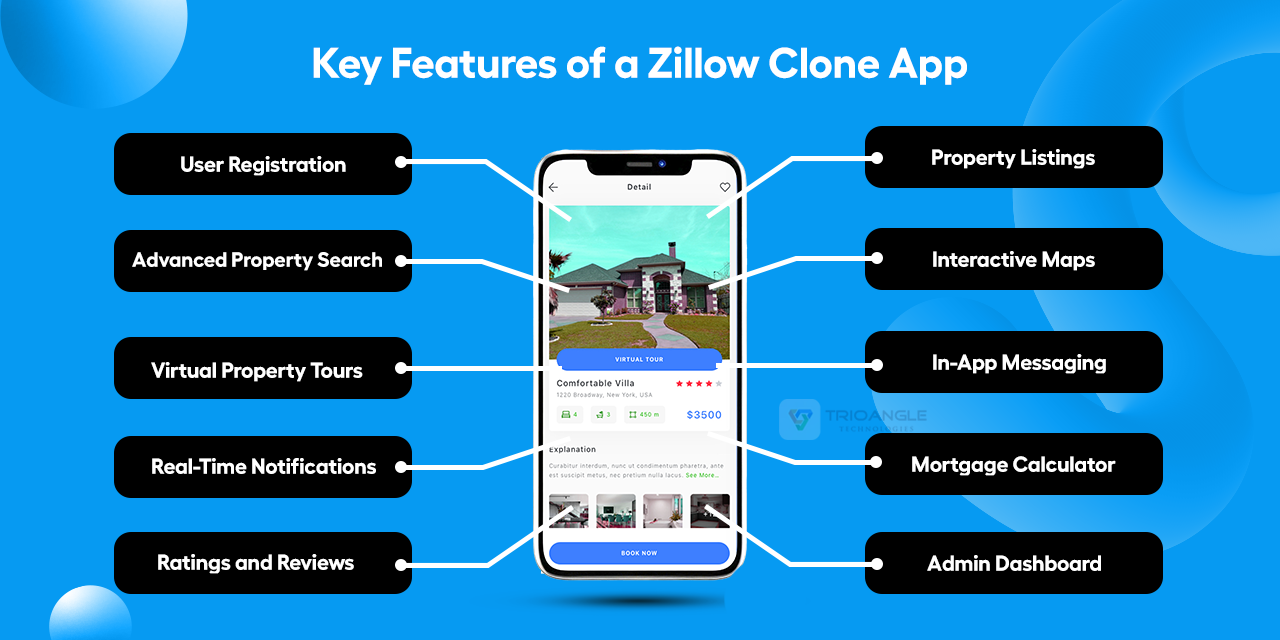
User Registration
A commercial real estate app like Zillow allows users to create profiles for a personalized experience. Users can easily log in to the app using their phone number, email, or social media accounts, ensuring convenient access to the platform.
Property Listings
Sellers can list out their properties by providing comprehensive details, such as property photos, descriptions, amenities, and pricing. The Zillow-like app also allows sellers to easily update their listings with new photos or information.
Advanced Property Search
The foundation of a Zillow like property rental app development is its powerful property search engine. This feature allows buyers/renters to refine their searches by criteria such as location, price range, property type, size, and amenities. This makes it easier for buyers/renters to find their ideal property.
Interactive Maps
Integrating a map view enables users to visualize properties along with nearby amenities such as schools, parks, and public transport. The map should provide street views and satellite images for better context.
Virtual Property Tours
A real estate app like Zillow utilizes technologies for virtual property tours, including 360-degree photos and videos, to provide users with a realistic walkthrough of properties. This allows buyers to explore properties virtually, giving them a true sense of the layout and ambiance without the need for a physical visit.
In-App Messaging
A built-in messaging feature in the Zillow clone app enables buyers/renters, sellers, and real estate agents to communicate directly within the app. This functionality enhances user engagement and accelerates the transaction process.
Real-Time Notifications
Push notifications are crucial for keeping users engaged. Buyers can receive alerts about new listings, price changes, or updates on properties they are interested in. Sellers are also notified when someone inquires about their property, ensuring timely communication.
Mortgage Calculator
A Zillow like real estate app provides a built-in mortgage calculator that helps buyers estimate their loan costs. Buyers can input property prices, down payments, and interest rates to get a clear idea of their potential monthly payments.
Ratings and Reviews
To enhance user experience and transparency, implement a review system that allows users to share their experiences with specific properties and real estate agents. This feature builds trust among buyers and helps them feel secure while using the platform.
Admin Dashboard
A comprehensive admin panel in the Zillow clone app enables app owners to manage listings, user accounts, and analytics efficiently. Admins can also generate reports on user activity, market trends, and overall app performance.
Monetization Strategies of a Zillow Clone App
Monetization is key to long-term profitability. Here are some strategies to make your Zillow clone a revenue-generating platform:
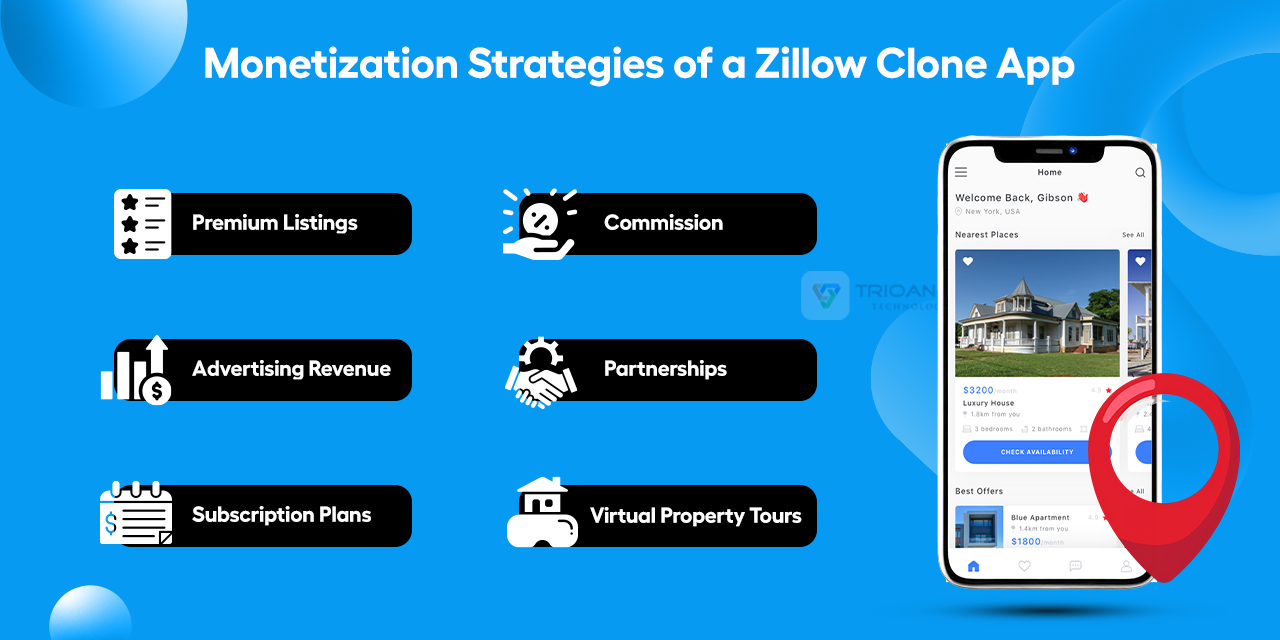
Premium Listings
Property visibility is important in real estate. Offer property owners and agents the option to pay for premium listings that showcase their properties at the top of your app’s homepage. This strategy enhances visibility, allowing them to sell properties more quickly while generating a steady revenue stream for you.
Advertising Revenue
In-app advertising is an effective revenue source for real estate platforms. You can offer ad space on your platform to local businesses, banks, and mortgage brokers. This strategy creates an effortless way to generate passive income.
Subscription Plans
Many apps offer exclusive features for a fee. You can implement subscription plans for users on a monthly or yearly basis. Offer a free basic plan and charge for a premium plan that offers advanced features. This subscription model ensures consistent revenue for your platform.
Commission
Charge a small percentage of commission on every transaction facilitated by your Zillow clone website. Even a commission of 1-2% can accumulate significantly as the volume of transactions increases.
Partnerships with Mortgage Providers
Did you know that 60% of homebuyers rely on a mortgage? You can form partnerships with mortgage providers and earn referral fees whenever users secure loans through your app. By integrating mortgage calculators into your Zillow like app development, you can guide users to relevant loan offers, creating additional revenue opportunities.
Virtual Property Tours
Offer real estate agents and property owners the option to create immersive 3D property tours for a fee. This feature can turn more viewers into potential buyers or renters while attracting more users to your app, ultimately increasing your revenue.
Steps to Build a Zillow Clone App
To develop a property rental app like Zillow that offers a seamless user experience and powerful property solutions, follow these key steps. Let’s start with the first step:
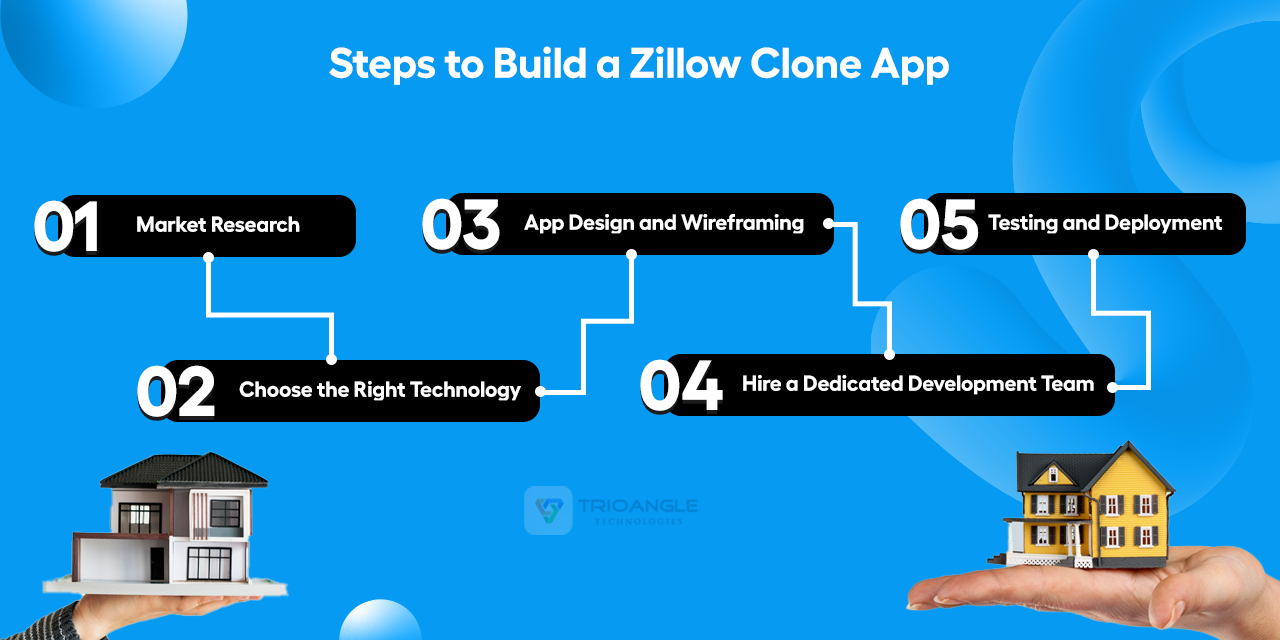
Market Research
Begin by conducting thorough market research to assess competitors, identify market trends, and uncover potential opportunities to develop an app like Zillow.
Analyze your target audience to understand their preferences, pain points, and expectations.
This information will guide your app development, helping you to design features and services that meet user needs effectively.
Choose the Right Technology
Next, select the most suitable technology to make your app stand out. Decide whether to build an app like Zillow for iOS, Android, or a cross-platform solution. Opting for cross-platform development can save both time and costs by allowing a single codebase for multiple platforms.
Pay attention to the backend infrastructure and integrate necessary third-party APIs.
Ensure that the selected technologies offer scalability, security, and a seamless user experience.
App Design and Wireframing
Design a user-friendly and visually appealing app by creating wireframes and prototypes that outline the app’s structure and user flow.
To enhance the user experience, focus on an intuitive and easy-to-navigate design. Ensure the app’s design is responsive and accessible on mobile devices and desktops.
Hire a Dedicated Development Team
To build a successful commercial real estate app like Zillow, you must assemble a skilled team of developers. Both frontend (user interface) and backend (server infrastructure) development are crucial.
The front end focuses on delivering a visually appealing and user-friendly experience, while the back end manages data storage, security, and functionality. Together, they contribute to a seamless and efficient property rental app.
Test and Deploy Your Zillow Clone App
After development, thoroughly test the app to identify and resolve any bugs or issues. Conduct usability tests to ensure the app delivers a seamless user experience, and assess the app’s security and data protection features.
Rigorously test key functionalities, such as property listings, browsing, search filters, payments, and customer support, across multiple devices and operating systems to ensure optimal performance.
Once your Zillow clone app is ready, deploy it to the app stores for public access. After launch, monitor its performance and gather user feedback for continuous updates and improvements.
Build Your Zillow Clone App Today!
In 2024, developing a real estate platform like Zillow is a strategic move. As online real estate transactions continue to grow and demand for 24/7 service access increases, having a strong online presence is crucial. A Zillow like app development enables you to reach a global audience without geographical barriers, maximizing your business potential.
Don’t wait. Start building your Zillow clone today and take advantage of the limitless opportunities in the booming online real estate industry!
Are You Looking for the Best Zillow Clone Script for Your Business?

